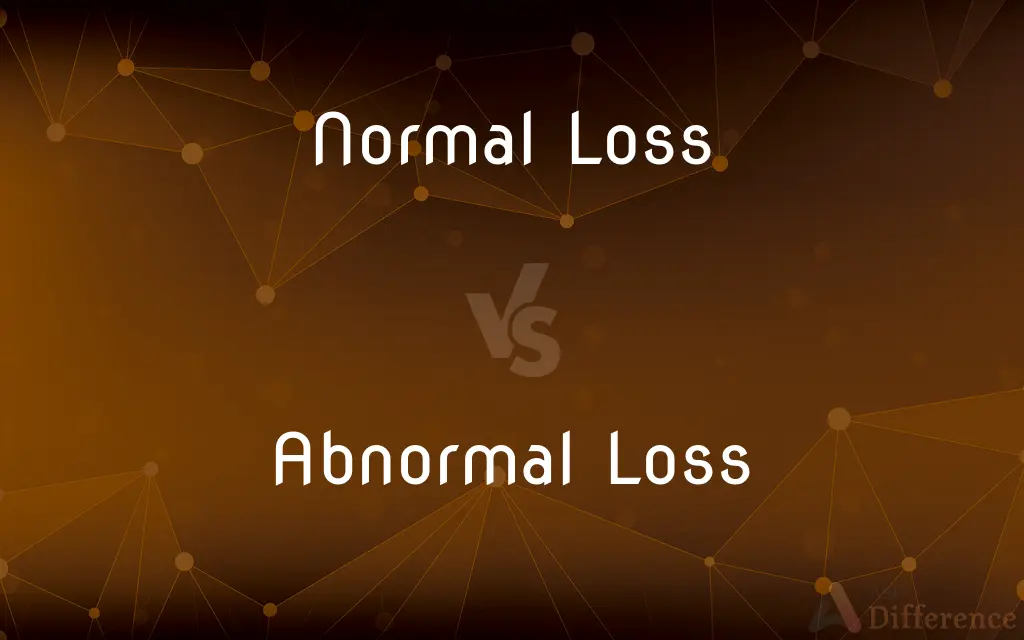Normal Loss vs. Abnormal Loss — What's the Difference?
By Tayyaba Rehman — Published on December 24, 2023
Normal Loss is an expected reduction in production or inventory, while Abnormal Loss exceeds this expectation and is often avoidable.

Difference Between Normal Loss and Abnormal Loss
Table of Contents
ADVERTISEMENT
Key Differences
Normal Loss is a term used in industries and businesses to describe the expected loss that naturally occurs during a process due to factors like wastage, shrinkage, or evaporation. On the other hand, Abnormal Loss refers to the loss that is unexpected and arises due to factors outside the regular operational process, such as accidents, theft, or major machine breakdowns.
Normal Loss is usually considered a part of the process and is often accounted for in the initial stages of production. This means companies usually factor in this loss while determining cost, pricing, or setting inventory levels. Conversely, Abnormal Loss is an irregular occurrence and can indicate problems in the production process or operational inefficiencies.
In financial and accounting terms, Normal Loss can be seen as a cost of doing business. This loss, being anticipated, might be absorbed into the cost of production. However, Abnormal Loss usually leads to additional unexpected expenses, as it represents inefficiencies, and therefore, might be treated differently in financial books.
While Normal Loss might not necessitate immediate corrective action since it's a part of the standard operating procedure, the occurrence of Abnormal Loss usually triggers a review. Companies might investigate the root cause of the abnormal loss to prevent its recurrence in the future.
In summary, while both Normal Loss and Abnormal Loss represent reductions, the former is predictable and often unavoidable, whereas the latter is unexpected and typically warrants corrective measures.
ADVERTISEMENT
Comparison Chart
Nature
Expected and inherent in the production process.
Unexpected and not inherent to the process.
Financial Treatment
Often absorbed into the cost of production.
Treated as an unexpected expense.
Cause
Factors like wastage, shrinkage, evaporation.
Accidents, theft, major breakdowns.
Action Required
Typically no immediate corrective action needed.
Triggers review and possible corrective action.
Frequency
Regular and anticipated.
Irregular and not anticipated.
Compare with Definitions
Normal Loss
An anticipated reduction during production.
During juice extraction, some Normal Loss is expected due to fruit pulp wastage.
Abnormal Loss
Not factored into regular operational expectations.
The spillage during transport is considered an Abnormal Loss.
Normal Loss
A usual decrease in inventory due to inherent factors.
In wood processing, there's a Normal Loss due to sawdust.
Abnormal Loss
A loss exceeding expected parameters.
A factory fire resulted in an Abnormal Loss of finished goods.
Normal Loss
The expected cost of doing business in certain industries.
Some Normal Loss of water is expected in the beverage industry due to evaporation.
Abnormal Loss
Unanticipated reductions due to unexpected events.
The theft in the warehouse led to an Abnormal Loss of inventory.
Normal Loss
A routine outcome of operational procedures.
In the dairy industry, Normal Loss occurs during the pasteurization process.
Abnormal Loss
A sudden decline in resources or assets outside standard projections.
The unexpected spoilage of perishables in the store is an Abnormal Loss.
Normal Loss
A consistent and predictable reduction in materials.
During metal forging, a Normal Loss of material due to burn-off is common.
Abnormal Loss
A sign of inefficiencies or problems in the process.
The machine breakdown today caused an Abnormal Loss in production.
Common Curiosities
What is Normal Loss in the context of production?
Normal Loss is the expected reduction in production or inventory due to inherent factors like wastage or shrinkage.
Is Normal Loss usually factored into product pricing?
Yes, as it's an expected part of the process, it's often accounted for in cost and pricing.
Can Normal Loss be eliminated?
Not typically, as Normal Loss is inherent in certain processes and is often considered unavoidable.
Can Normal Loss vary between industries?
Absolutely. What's considered Normal Loss in one industry might be different in another.
Do financial books treat Normal Loss and Abnormal Loss the same way?
No, Normal Loss is often absorbed into production costs, while Abnormal Loss is treated as an unexpected expense.
How does Abnormal Loss differ from Normal Loss?
While Normal Loss is anticipated and part of the process, Abnormal Loss is unexpected and arises from irregularities.
What might cause an Abnormal Loss?
Causes can range from accidents, theft, major equipment breakdowns to human errors.
How should companies address Abnormal Loss?
Companies should investigate its root cause and implement corrective measures to prevent recurrence.
Should companies be concerned about recurring Abnormal Losses?
Yes, recurring Abnormal Losses can indicate deeper operational issues that need addressing.
Is the frequency of Normal Loss consistent?
Yes, it's typically consistent and predictable based on industry standards.
Is Abnormal Loss always avoidable?
Not always, but its occurrence indicates potential inefficiencies or problems that warrant review.
Can insurance cover Abnormal Loss?
Depending on the cause and the insurance policy, Abnormal Losses like those from fires or theft can be covered.
Does Normal Loss affect profit margins?
Since it's factored into costs and pricing, it doesn't typically have a direct impact, but minimizing it can improve margins.
Is Normal Loss a sign of inefficiency?
Not necessarily. It's an expected reduction and is inherent in some processes.
How can businesses reduce Normal Loss?
While some degree of Normal Loss is unavoidable, optimization and process improvements can help minimize it.
Share Your Discovery

Previous Comparison
NTFS vs. FAT
Next Comparison
Gibbs Free Energy vs. Helmholtz Free EnergyAuthor Spotlight
Written by
Tayyaba RehmanTayyaba Rehman is a distinguished writer, currently serving as a primary contributor to askdifference.com. As a researcher in semantics and etymology, Tayyaba's passion for the complexity of languages and their distinctions has found a perfect home on the platform. Tayyaba delves into the intricacies of language, distinguishing between commonly confused words and phrases, thereby providing clarity for readers worldwide.
















































